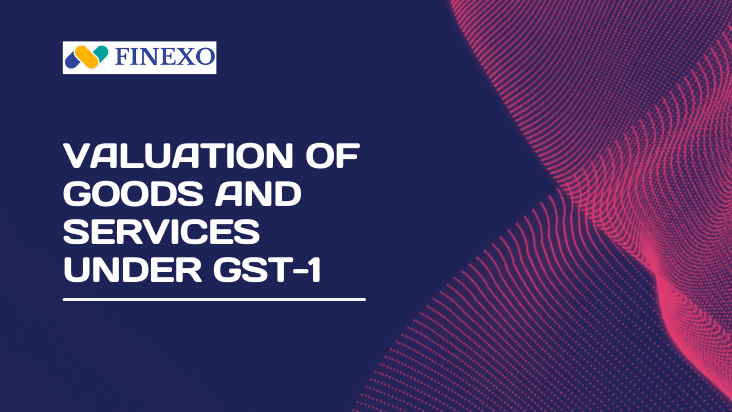
Valuation of goods and services under GST
It is important to know how to arrive at the value on which tax is paid. Provisions related to value of supply set out the mechanism to compute such value on the basis of which CGST, SGST/UTGST and IGST should be paid. In this article we will discuss all such provisions-
Value of supply on the basis of transactional value-
Value of supply is determined on the basis of transactional value in terms of section 15(1), when supply made to unrelated person (who are not related to each other as per explanation given in section 15) and price is the sole consideration.
So, now it is important to understand the meaning of related person-
- Such persons are officers or directors of one another’s business.
- Such persons are legally recognised partners in business.
- Such persons are employer and employee.
- Any person directly or indirectly owns, controls or holds 25% or more of the outstanding voting stocks or shares of both of them.
- One of them directly or indirectly controls the other.
- Both of them are directly or indirectly controlled by a third person.
- Together they directly or indirectly control a third person or they are the members of the same family.
Transactional value has some inclusions and exclusions which are as follows-
Inclusions-
- Taxes other than GST
- Third party payment made by recipient in relation to the supply, which supplier was liable to pay and were not included in the price.
- Incidental expenses including anything done by the supplier in respect of the supply till delivery of goods/supply of services, if charged to recipient.
- Subsidies directly linked to price of supply other than those the ones given by central /state government.
- Interest/late fee/penalty for delay in payment of consideration.
Exclusions-
- Discounts given before or at the time of supply and recorded in the invoice.
- Post supply discount/incentive, if known in advance and linked with invoices and proportionate input tax credit reversed by the recipient.
Example-
BW Ltd. Manufactures tobacco products. It has provided the following particulars relating to goods sold by it to CF Ltd.
| Price of goods (exclusive of taxes and discounts) | 60000 |
|---|---|
| Excise duty | 6000 |
| Packing charges | 2000 |
| Freight (arranged by BW Ltd) | 1600 |
| Total amount billed to CF ltd before any discount | 69600 |
| Discount @2% of the price of goods recorded in the invoice |
The final amount charged from CF Ltd. Is 69600 less discount @2%.
Determine the value of taxable supply made by BW Ltd.
Solution -
| Price of goods (exclusive of taxes and discounts) | 60000 |
|---|---|
| Add- Excise duty | 6000 |
| Packing charges | 2000 |
| Freight | 1600 |
| Less- Discount @2% on 60000 Rs | (1200) |
| Value of taxable supply | 68400 |
Valuation rules- These rules are used when supply is between related person or price is not the sole consideration. Let us discuss each rule one by one-
Rule 27 - Consideration not wholly in money-
Value shall be either of the following in the given order-
- Open market value
- Total of consideration in money+ amount equal to the consideration not in money
- Value of supplies of like kind and quality
- Consideration in money + money value of non-monetary consideration computed as per rule 30 or 31 in that order.
Example-
Where a new phone is supplied for twenty thousand rupees along with the exchange of an old phone and if the price of the new phone without exchange is twenty-four thousand rupees, the open market value of the new phone is twenty-four thousand rupees.
Rule 28 - Supply between distinct / related persons, other than agent-
Value shall be either of the following in the given order-
- Open market value
- Value of supplies of like kind and quality
- Value as per rule 30 and 31 in that order.
- Option to supplier to value goods sold as such by recipient-
Value= 90 % of price charged by recipient to its unrelated customer
- Recipient eligible for ITC-
Invoice value = open market value (taxable value)
Rule 29 - Supply made / received through an agent-
Value shall be either of the following in the given order-
- Open market value or 90% of price charged by recipient to his unrelated customer for supplies of like kind and quality
- Value as per rule 30 or 31 in that order.
Example- A principal supplies groundnut to his agent and the agent is supplying groundnuts of like kind and quality in subsequent supplies at a price of five thousand rupees per quintal on the day of supply. Another independent supplier is supplying groundnuts of like kind and quality to the said agent at the price of four thousand five hundred and fifty rupees per quintal. The value of supply made by the principle shall be four thousand five hundred and fifty rupees per quintal or where he exercises the option, the value shall be 90% of five thousand rupees i.e., four thousand five hundred rupees per quintal.
Rule 30 - Value based on cost-
Value shall be 110% of cost of production/ acquisition / provision of goods or services
Rule 31 - Residual method (best judgement method)-
Value shall be determined using reasonable means consistent with the principles and general provisions of section 15 and valuation rules. For services, rule 31 can be adopted before rule 30.
Rule 31A- Value of supply of lottery, chance to win in betting/gambling/ horse racing in club-
Lottery organised by state government- 100/128 of the face value of ticket or 100/128 of the price as notified in the official gazette by the organising state (State Government which conducts the lottery either within the state or outside the state), whichever is higher.
Actionable claim in form of chance to win in betting, gambling or horse racing in a race club- 100% of the face value of the bet or the amount paid into the totalisator.
Rule 32 - Value in respect of certain specific supplies-
Purchase sale of foreign currency-
1st method- value= (buying/selling rate – RBI reference rate at that time) * total units of currency. If no RBI reference rate, value= 1% of INR received/provided. If the currencies exchanged are not in INR, value= lesser of the 2 amounts that would have been received by converting any of currencies into INR at RBI reference rate OR
2nd method
| Currency | Value |
|---|---|
| Up to Rs 1,00,000 | 1% or Rs 250 whichever is higher |
| From 1,00,001 to 10,00,000 | Rs 1000 + 0.5% |
| From 10,00,001 | Rs 5,500 + 0.1% subject to maximum of Rs 60,000 |
Booking of tickets by air travel agent-
Value= 5% of basic fare for domestic bookings and 10% of the basic fare for international bookings
Life Insurance Business-
- If amount allocated for investment is intimated-
Value= Gross premium less amount allocated for investment
2. Single premium annuity policy where amount allocated for investment is not intimated-
Value= 10% of single premium
3. Other cases-
Value= 25% of premium in first year and 12.5% of premium in subsequent years
4. Policy only towards risk cover
Value= entire premium
Buying and selling of second-hand goods-
Value= selling price- buying price (ignore if value is negative)
Purchase value of goods repossessed from unregistered borrower = purchase price- 5% per quarter or part thereof from date of purchase till the date of disposal by the person making repossession
Coupon/Voucher-
Value= money value of supplies redeemable against such voucher/coupon
Notified services between distinct persons without consideration-
Value= Nil, if ITC is available
Rule 33 - Supply as pure agent-
Pure agent is a person who-
- Enters into a contractual agreement with the recipient of supply to act as his pure agent to incur expenditure or costs in the course of supply of goods or services or both.
- Neither intends to hold nor holds any title to the goods or services or both so procured or supplied as pure agent of the recipient of supply.
- Does not use for his own interest such goods or services so procured and
- Receives only the actual amount incurred to procure such goods or services in addition to the amount received for supply he provides on his own account.
Cost incurred by the supplier as a pure agent of recipient shall be excluded from the value, if all the following conditions are satisfied-
- The supplier acts as a pure agent of the recipient of the supply, when he makes the payment to the third party on authorisation by such recipient.
- The payment made by the pure agent on behalf of the recipient of supply has been separately indicated in the invoice issued by the pure agent to the recipient of the service and
- The supplies procured by the pure agent from the third party as a pure agent of the recipient of supply are in addition to the services he supplies on his own account.
Rule 34 - Rate of exchange for determination of value-
GOODS= Rate notified by CBIC under Customs Act on the date of time of supply of such goods
SERVICES= rate as per GAAP on the date of time of supply of services
Rule35 - Value inclusive of taxes-
Where value of supply is inclusive of CGST, SGST/UTGST or IGST, the tax amount is calculated by making back calculations.
Tax amount = (value inclusive of GST * GST rate in % of IGST or CGST, SGST/UTGST)/ 100 + sum of applicable GST rates in %.
Important sections-
| Sections | topic |
|---|---|
| Section 15 (1) | Transaction value |
| Section 15(2) | Inclusions |
| Section 15(3) | Exclusion of discounts |
| Section 15(4) | Supply where price is not the sole consideration |
| Section 15(5) | Supply is a notified supply |
About CA Shravagi Jain
CA Shravagi Jain has completed her CA in 2021. She is engaged in writing articles and also teaching CA students.
